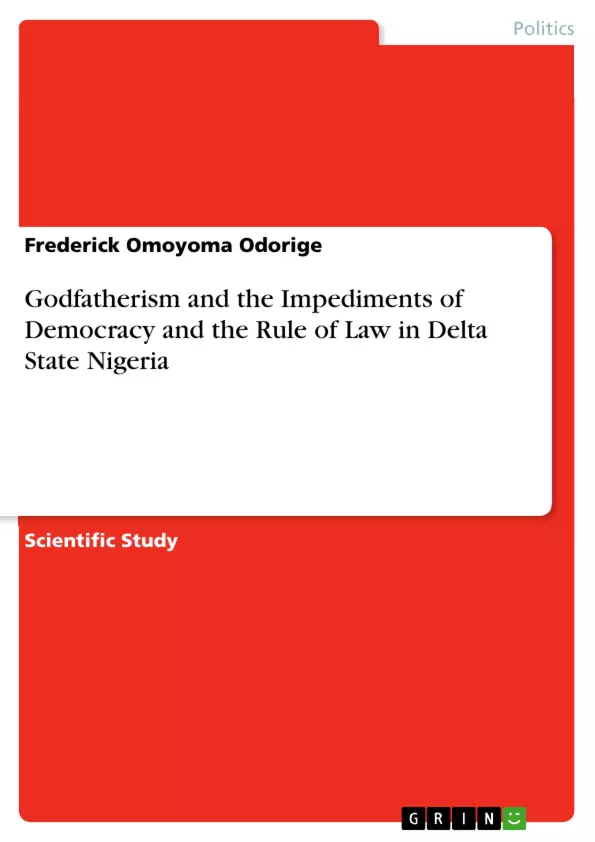In the developing world of Africa, transition of a group of people into the class of political elites is mostly facilitated by a 'godfather' (a prominent member of the elite class) or a network of godfathers. Both the sub-elite and non-elite could be recruited into the political elite class when they agree to meet the strident conditions for such a recruitment exercise.
The godfather is a self-seeking enigma with material frame of opulence, affluence and influence mixed with ruthless decisiveness. Political godfathers use their influence to block others from being relevant participants in the politics of the society through their wealth and power. Godfathers are political gatekeepers that determine the entrants. He or she is the impervious guardian figure that manipulates the political landscape by dictating and providing the lifeline and navigational direction to the godson or goddaughter who in turn, surrender to reciprocate with a service of total submission, subservience and provisions to the oracular personality with less priority concern to the citizens.
In the course of reaching a conclusion, this paper sets out to historicize on the trajectories of the democratic and human conflicts that emanates from Godfatherism in Delta state of Nigeria with related references to other parts of the country; to examine the causative factors orchestrating the phenomenon of Godfatherism in the state; to specifically ascertain some selected incidences of Godfatherism in the electoral processes in Delta state within a specified period; to identify the implications of the prevalence of godfatherism in the developmental process of Delta state; and to offer recommendations on practical ways to arrest the malaise of Godfatherism.
Frequently asked questions
What is the main topic of the document?
The document discusses the phenomenon of "godfatherism" in Nigerian politics, with a specific focus on Delta State, and its impact on democracy, development, and governance.
What is "godfatherism" as defined in this context?
"Godfatherism" refers to the influence of wealthy and powerful individuals ("godfathers") who manipulate the political process, often through financial contributions, moral support, and sometimes unethical or illegal means, to ensure the election or appointment of their chosen candidates ("godsons" or "goddaughters").
What are the key characteristics of a political godfather in Nigeria?
Political godfathers are often described as self-seeking, opulent, influential, and ruthless individuals who use their power to control political outcomes and benefit personally, often at the expense of the citizens' welfare.
How does godfatherism affect the electoral process?
Godfathers can influence elections through various means, including rigging, violence, manipulation of electoral bodies, and imposition of candidates against the will of the people.
What are the consequences of godfatherism on democracy and development?
Godfatherism can lead to corruption, disenfranchisement of voters, exorbitant election costs, imposition of unqualified candidates, erosion of trust in elections, and diminished welfare for the general population.
Who are some of the prominent figures mentioned in relation to godfatherism in Delta State?
The document mentions former Governor James Onanefe Ibori and Edwin Clark as examples of political godfathers in Delta State.
What are some of the historical roots of godfatherism in Nigeria?
The document suggests that godfatherism arose after a long period of military rule and is associated with a power vacuum and the desire to seize authority.
What are some examples of how godfathers manipulate the political system?
Examples include multiple voting, exchanging ballot boxes, stealing electoral materials, employing violence, and using the media to discredit opponents.
How does prebendalism and clientelism relate to godfatherism?
The document links godfatherism to prebendalism (the use of public office for personal gain) and clientelism (patron-client relationships), which contribute to the corruption and inequality associated with godfatherism.
What are some recommendations to combat godfatherism?
Recommendations include enforcing laws against election violations, prosecuting sponsors of disenfranchisement, reducing the cost of elections, empowering electoral bodies like INEC, and promoting transparency and accountability in governance.
What impact has this dynamic had on local government autonomy?
The Senate bills seek to end joint accounts, and stop government Councils who are swept into elections who are forced to release money which detriments local development.
Who is Nwaoboshi?
A senator who visited and spoke of the accomplishments of former governor Ibori in prison.
- Quote paper
- Frederick Omoyoma Odorige (Author), 2017, Godfatherism and the Impediments of Democracy and the Rule of Law in Delta State Nigeria, Munich, GRIN Verlag, https://www.grin.com/document/373055



